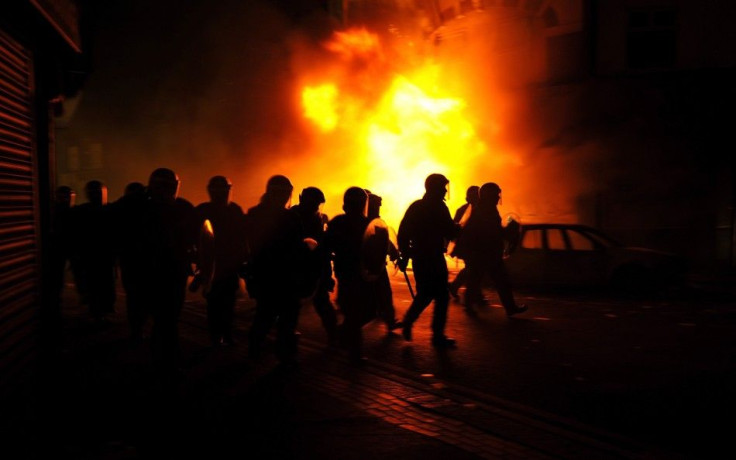London Riots: Will UK Police Use Water Cannons?

As riots continue to spread across London and other cities, police are considering meeting looters with water cannons for the first time in English history.
Four days of rioting in various districts in London, as well as in Liverpool and Birmingham, have seen clashes between masked youths and heavily equipped police officers, who have thus far been unable to contain the growing chaos.
As citizens flee neighborhoods in fear, both politicians and newspapers are calling for the use of water cannons, and possibly even tear gas, to drive looters away. Although England has never used the method, water cannons are employed as crowd-control tools in many Euopean countries, as well as the United States.
Home Secretary Theresa May, who has been vocal during the whole ordeal, rejected the idea outright Tuesday.
"The way we police in Britain is not through use of water cannon," she said. "The way we police in Britain is through consent of communities."
However, some politicians disagree with May, and are insisting that the police be allowed to use any means necessary to quell a situation that has so far been uncontrollable.
"I am not saying that is necessarily what we want, but we have got to allow the police to use their powers and, once they have arrested individuals, for the judiciary to be able to punish them," Patrick Mercer, a Conservative MP and former army officer, told BBC Television Tuesday morning.
"They should have the tools available, and they should use them if the commander on the ground thinks it is necessary. I don't think we have necessarily to mollycoddle Englishmen because we don't mollycoddle Irishmen," he added, referring to the use of water cannons on rioters in Northern Ireland last month.
Demonstrators have thrown firebombs at police officers and torched property, cars and London city buses. In Tottenham, where the violence started Saturday night, rioters smashed store windows and burned buildings to the ground.
Rioting and looting has been continuing in the British capital since the weekend, when angry citizens of Tottenham marched to police headquarters to protest the fatal shooting of 29-year-old Mark Duggan. The anarchy then spread to Hackney, Peckham and Lewisham on Monday afternoon and by nightfall reached the neighborhoods of Ealing, Camden and Croydon.
A total of 16,000 police officers are currently in the capital. At least 400 people have been arrested in London at last report.
In what police and the British media have called a "copycat riot," gangs of masked youths began looting retail shops in the center of Birmingham Monday night, and the new Bullring shopping complex was attacked. Anywhere from 30 to 80 people have been arrested so far in the Midlands city, according to varying reports.
In Liverpool, police are reporting a "number of isolated outbreaks of disorder," including the familiar trademarks of the London rioters, namely burning cars and broken windows.
Liverpool is traditionally a working-class city, with a similar reputation as the tough, blue-collar Tottenham, where the riots began Saturday evening. Witnesses are detailing incidents of violence and destruction mirroring what has been happening London for the past few days.
© Copyright IBTimes 2024. All rights reserved.





















